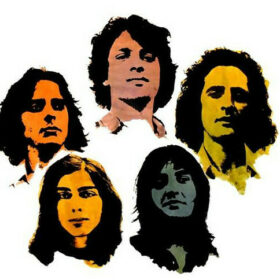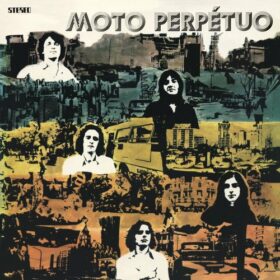Moto Perpetuo was a brazilian progressive rock band and MPB who was in activity 1973 to 1975. The group became known for revealing the brazilian singer, composer and pianist Guilherme Arantes. They released a single self-titled album that, after...
Read more
Genres: Brazilian Rock, Progressive Rock, Psychedelic Rock
Moto Perpetuo was a brazilian progressive rock band and MPB who was in activity 1973 to 1975. The group became known for revealing the brazilian singer, composer and pianist Guilherme Arantes. They released a single self-titled album that, after successive re-releases in the following decades, became a cult classic.
In 1970, Guilherme Arantes went to see the play Plug, produced by his cousin Solano Ribeiro at Teatro Ruth Escobar and met Diógenes Burani. In a short time, Guilherme (keyboards), Diógenes (drums and percussion) and Rodolfo Grani Júnior (bass) would be accompanying Jorge Mautner in shows in São Paulo. When he entered the Faculty of Architecture and Urbanism at the University of São Paulo, Guilherme met another musician: Cláudio Lucci. When Guilherme introduced his two friends – Diógenes and Cláudio – to each other, the three decided to start a band. Diogenes, in turn, had participated in an “embryo” of the group that Rita Lee was trying to set up with her friend Lucinha Turnbull, after the departure of the first of the Mutantes, which was called Cilibrinas do Eden. From this project, Diógenes had met Gerson Tatini (bass) and Egídio Conde (guitar), suggesting their names to Guilherme and Cláudio.
After a time of formation of the group, call attention Moracy Val, journalist and producer of the debut album of Dry & Wet starting to work in promoting the band, getting a record deal with GEL for the release of an album studio by Continental label – same record label as Ney Matogrosso, João Ricardo and Gérson Conrad. Thus, in September and October 1974 they recorded – at Estúdio Sonima, in São Paulo – their debut album, Moto Perpétuo, produced by Pena Schmidt and released on November 11, 1974 with a presentation at the Theatro Treze de Maio. A few months later, the group would end up with internal differences, with Guilherme Arantes wanting to move away from that progressive sonority that he considered “elitist”.
Genres: Brazilian Rock, Progressive Rock, Psychedelic Rock




